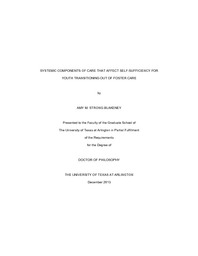
ATTENTION: The works hosted here are being migrated to a new repository that will consolidate resources, improve discoverability, and better show UTA's research impact on the global community. We will update authors as the migration progresses. Please see MavMatrix for more information.
Show simple item record
| dc.contributor.author | Strong-Blakeney, Amy M. | en_US |
| dc.date.accessioned | 2014-03-12T23:51:51Z | |
| dc.date.available | 2014-03-12T23:51:51Z | |
| dc.date.issued | 2014-03-12 | |
| dc.date.submitted | January 2013 | en_US |
| dc.identifier.other | DISS-12385 | en_US |
| dc.identifier.uri | http://hdl.handle.net/10106/24141 | |
| dc.description.abstract | Although research indicates that former foster youth fare poorly in a number of domains of self-sufficiency upon leaving care, it is unclear whether their poor outcomes are related to systemic components of care. The purpose of this study was to examine the systemic components of foster care that either promote or inhibit self-sufficiency in foster youth once they transition from care through the lens of Bronfenbrenner's ecological theory. Using data gathered from both Child Protective Services and Transitional Resource Action Center's databases, the study described in this dissertation explored factors of care that most influence former foster youth's self-sufficiency. Results indicated that none of the factors of care fully explained youth's self-sufficiency. Findings are discussed in relation to both ecological and developmental theory. | en_US |
| dc.description.sponsorship | Scannapieco, Maria | en_US |
| dc.language.iso | en | en_US |
| dc.publisher | Social Work | en_US |
| dc.title | Systemic Components Of Care That Affect Self-sufficiency For Youth Transitioning Out Of Foster Care | en_US |
| dc.type | Ph.D. | en_US |
| dc.contributor.committeeChair | Scannapieco, Maria | en_US |
| dc.degree.department | Social Work | en_US |
| dc.degree.discipline | Social Work | en_US |
| dc.degree.grantor | University of Texas at Arlington | en_US |
| dc.degree.level | doctoral | en_US |
| dc.degree.name | Ph.D. | en_US |
Files in this item
- Name:
- StrongBlakeney_uta_2502D_12385.pdf
- Size:
- 609.5Kb
- Format:
- PDF
This item appears in the following Collection(s)
Show simple item record


